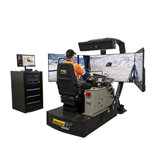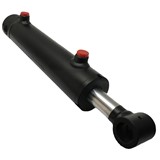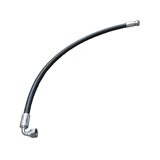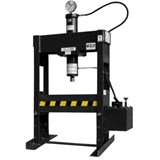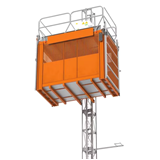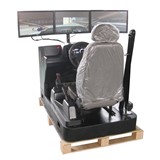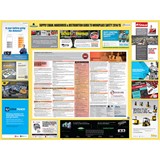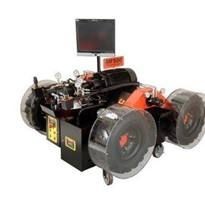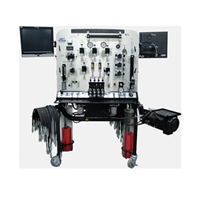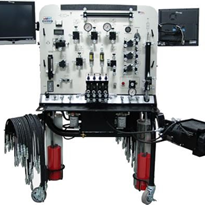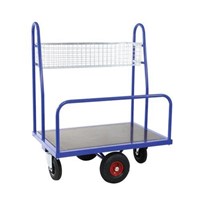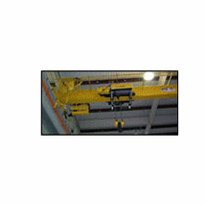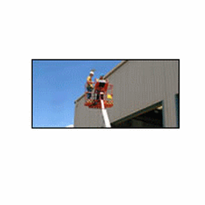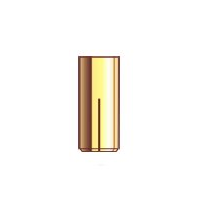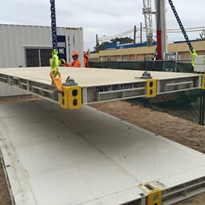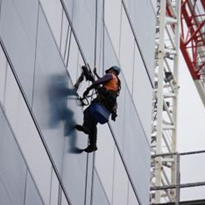The majority of equipment used in the construction industry is hydraulic-powered. The hydraulic principle has been applied in the design and operation of heavy equipment such as excavators, forklift, bulldozers, cranes, etc. It also allows for significantly more accurate and precise motions to be achieved. Therefore, engineers are able to optimize certain operations, such as road grading and excavation of construction sites.
As hydraulic-powered equipment is employed in all areas of construction, workers need to be aware of the risks associated working with hydraulic equipment. Crushing, fractures, dislocations, lacerations, skin punctures, amputations, burns, and fluid injections are all examples of hydraulic injuries. Hydraulic failures can result in traumatic injury and death of the operators, but they can also cause additional damages through oil spills, as well as property and equipment loss due to fire and mechanical failure.
Hydraulic-powered equipment has the potential to inflict catastrophic harm or death if they are not properly de-energized.
Hydraulic technicians are expected to use their engineering knowledge to diagnose errors in hydraulic equipment like excavators, cranes and pumps. They may also assist in the design and development of hydraulic structures such as bridges, dams and canals. Hydraulic technicians may use computers and other technology to help them identify issues in the development, manufacturing or operational stages of a project. After the completion of a project, they often perform routine check-ups to ensure the quality and functionality of the product.
They may also be involved in:
- Analysing the performance of equipment meters
- Assembling hydraulic equipment
- Installing hydraulic systems
- Modifying or improving hydraulic equipment
- Performing preventative maintenance
- Reading blueprints for system or structural projects
- Repairing hydraulic equipment
- Using software to design and test equipment
Therefore, they need to be qualified in operating hydraulic equipment and be trained to ensure that they understand the safe operation procedure and how to act in unexpected situation. They must be able to correctly diagnose the problem when working with the machines and properly deenergize the entire process line before starting the work to avoid accidents.
This increases the need for training at the vocational institutes for students studying to be technicians. Hydraulic training in the construction industry fits the requirements of current hydraulic transmissions. Students can gain knowledge of fundamental hydraulic circuit control and practice hands-on skills. Not only technicians, but managers, safety officers and everyone who works closely with the technician must be trained In hydraulics.
Training at the college level with the help of hydraulic training systems educational equipment builds their foundation for industrial work. The training equipment assists students in understanding the rudimentary theories which are highly essential. These also help students to develop troubleshooting capabilities which prove to be efficient in the construction industry vertical.
Working with hydraulic-powered system, means that workers are constantly exposed to safety hazards. The frequency of the incidents can be greatly reduced and completely avoided if the workers understand the principle of working safely with hydraulic equipment.
Stored Energy
Hydraulic systems in the construction industry store energy at pressures of up to 2000 PSI. When not properly released or deenergized, workers are putting themselves at risk of explosion or fluid injection injury which may cause permanent disability or possibly, fatality. Therefore, we mush ensure that any staffs that works on the hydraulic equipment is trained to perform the work.
Temperature
Human skin tissue scalds at 48 degrees Celsius. Despite the fact that many hydraulic systems have integrated oil cooling systems, they can run at temperatures of 60 degrees Celsius or more. Skin contact at these temperatures can cause first, second, and third degree burns. Safety clothing and PPE must be worn at all times.
Ignition
When a pinhole emerges in a hydraulic service line, determining the exact location of the failure in the hose line might be difficult due to the failure producing a hydraulic mist or vapour cloud. If small droplets of oil in the mist vapour come into contact with a nearby heat source, such as hot exhaust or a turbo, they can ignite quickly and violently.
Fluid Injection Injury
Pin hole sized leaks can also result in a thin jet of oil that acts similarly to a hypodermic needle. Manual checking of this leak using palms or fingers along the hose to pinpoint the exact spot of the leak putting the workers at the risk of fluid injection injury. This injury, if not treated immediately, can result in the permanent disability or loss of limbs. Injury from the hydraulic injection is common to all hydraulic equipment, regardless of system volume, and can occur at relatively low pressures as well.
Training initiatives by the construction sector to push safety to the forefront of discussion and on the minds of workers is thus crucial. The goal of hydraulic training for the construction industry is to provide important knowledge that will assist in reducing risk and eliminating hazards for workers, equipment, companies, and the environment.
Bestech Australia works with the industry and training institute to ensure that they have access to the suitable equipment to train their students safely and efficiently. We supply a wide range of technical training equipment such as plug-and-play mobile hydraulic training system with electronic troubleshooting capability which is safe for students to operate and leak-free. For more information, please consult one of our training specialists at 03 9540 5100 or visit www.bestech.com.au


.jpg)
